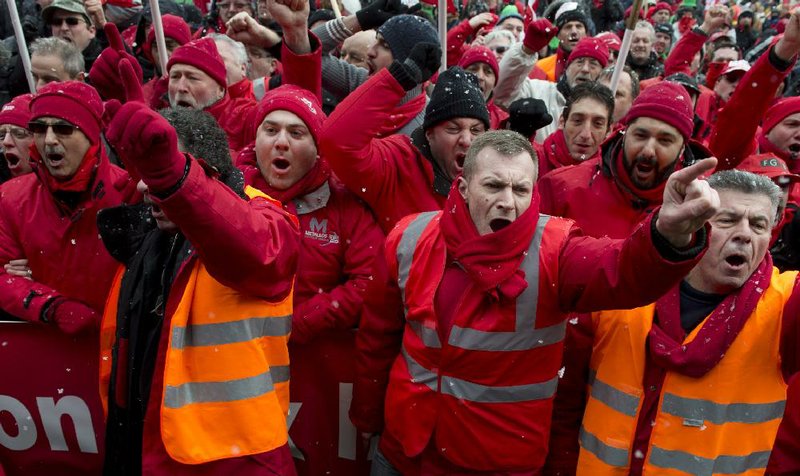BRUSSELS - Some 10,000 workers from across the European Union protested outside a summit of EU leaders Thursday, demanding they end years of austerity and instead focus on curbing runaway unemployment with more spending.
The protesters, standing in frost and snow just outside European Union headquarters, vented their frustration over spending cuts and tax increases imposed by the bloc’s governments to dealwith the debt crisis. Trade unions and an increasing number of economists say austerity has inflicted severe economic pain - the economies of the eurozone, the 17 EU countries that use the euro, are stuck in recession and unemployment is at a record high.
“Deepening the recession by dogmatically implementing austerity policies makes no economic sense whatsoever,” said European Parliament President Martin Schulz.
EU leaders acknowledge swift action is needed to keep social foment in southern Europe from bubbling over.
“I would not exclude that we run the risk of seeing a social revolution,” said Luxembourg Prime Minister Jean-Claude Juncker.
European Union President Herman Van Rompuy sought to focus attention of the groups’ 27 national leaders on spiraling youth unemployment, which in nations such as Spain and Greece is creating a ‘lost generation’ in the work force.
“We cannot turn a blind eye to the social emergency in some of our countries,” Van Rompuy said.
Unemployment across the eurozone rose to a record 11.9 percent during January, from 10.8 percent in the previous year. Youth unemployment is also continuing to rise unabated, peaking at 24.2 percent.
Yet the scope for action is limited. Most leaders remain committed to reducing public debt quickly, primarily through spending cuts and raising taxes.
“We won’t overcome a debt crisis with more debt,” Van Rompuy told the leaders in his opening address to the summit.
The two-day EU spring summit, which will stretch into Friday, traditionally centers on the economy, and peaking unemployment has given it special urgency.
“No leader can be happy with the situation where 26 million people are out of work in the European Union. That is why we are here,” said Ireland’s Prime Minister Enda Kenny.
The leaders have not yet offered an alternative to the fundamentals of the austerity policies, even though some appear ready to temper some of the measures.
European Union Monetary Affairs Commissioner Olli Rehn insisted strict austerity works and pointed to Kenny’s Ireland as an example of where “fiscal consolidation pays off.”
Ireland on Wednesday successfully sold $6.5 billion in 10-year bonds - its first long-term debt sale since being bailed out in 2010. The country embarked on a strict austerity program to meet the bailout conditions of its international creditors, the European Commission, European Central Bank and International Monetary Fund.
Rehn added that he expected EU leaders to back the European Commission’s line on austerity in parallel with steps to stoke sustainable growth and job creation.
Protesters at Thursday’s labor demonstration called for fundamental changes to the current measures, however.
Europe’s manufacturing industry has been hit by a succession of plant closures and job losses. At Thursday’s demonstration, workers from the steel giant ArcelorMittal and construction equipment maker Caterpillar protested recent moves by their companies to cut the size of their work forces.
“The policies that have been put in place have failed we are in a double-dip recession. We see that the efforts have been put on the shoulders of workers,” said Bernadette Segol, the general secretary of the European Trade Union Confederation.
Information for this article was contributed by Robert Wielaard and Don Melvin of the Associated Press.
Business, Pages 25 on 03/15/2013

